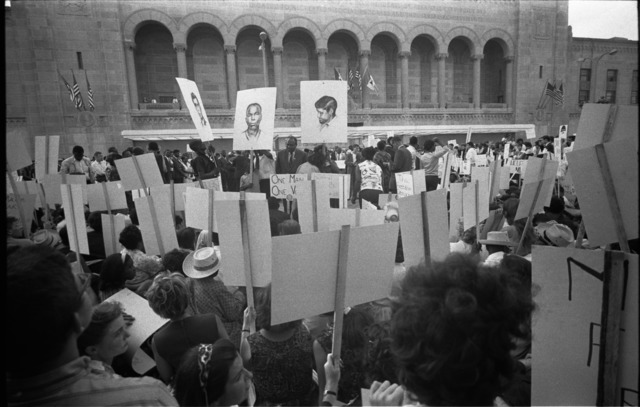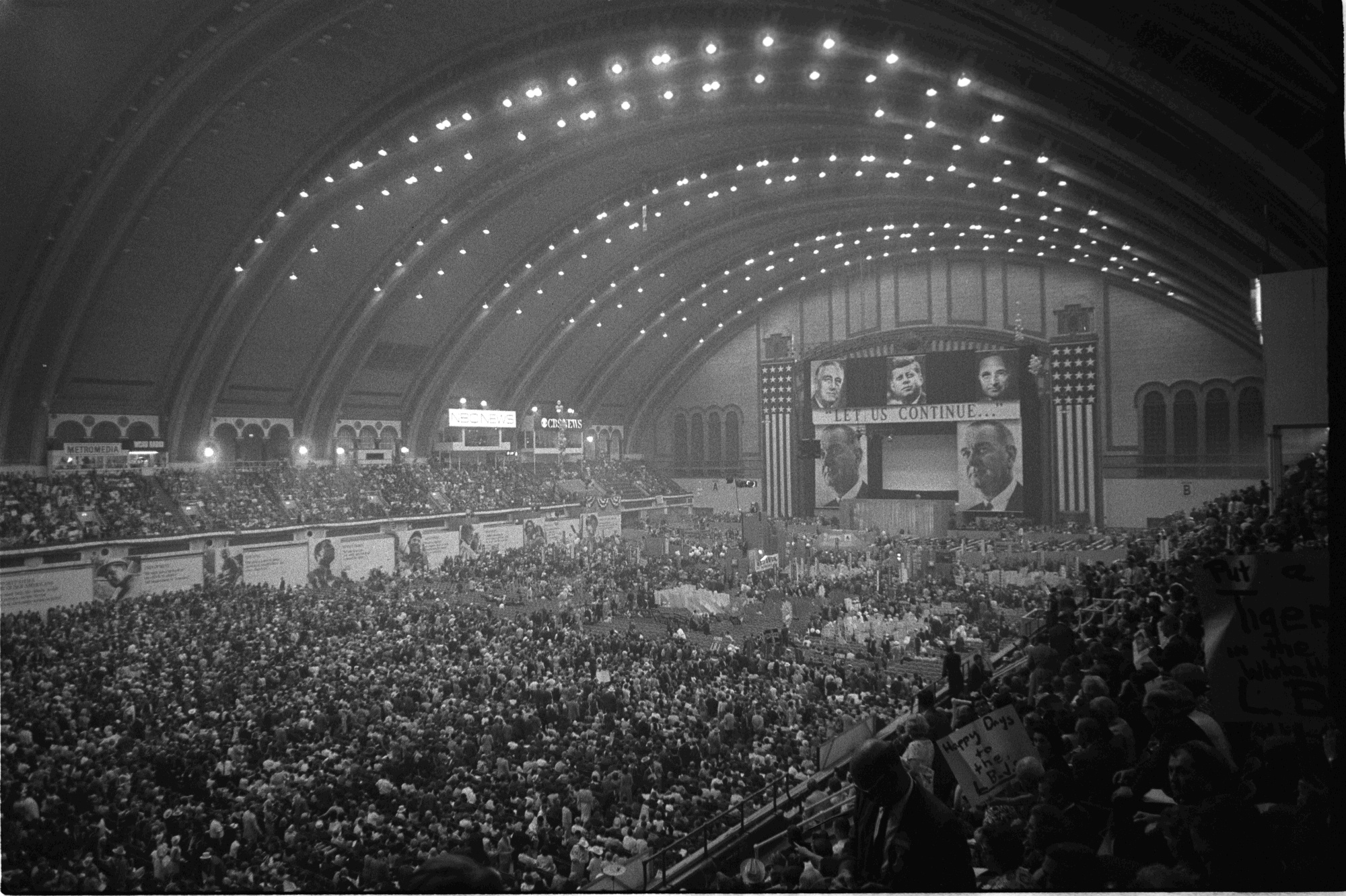
By Charles Dumas
NEW DAY: For those of us who spent most of the Summer working on the Freedom Project,leaving rural Mississippi was like entering a brave new world filled with strange people and ideas.
In the sixties the prevailing influence was the cold war, a conflict between the United States, and the Soviet Union (Russia) and Communist China. The US and Soviets had been allies during World War II (WWII) but afterwards the two countries became engaged in a struggle for political and economic dominance. Both had a bounty of nuclear weapons, which they threatened to use if attacked. Both recognized that a real military confrontation would most likely result in the annihilation of all human life on the planet. During that era every political event was framed in coldwar terms including the civil rights movement. Condemnations of being communist were hurled against the Movement and its leaders, even Dr. King. J. Edgar Hoover, the long time director of the FBI,was so convinced that the Movement had been infiltrated by communists, he spent large amounts of the government’s resources investigating civil rights leaders while often ignoring the white terrorist organizations, which were instigating and promulgating violence against civil rights workers.
During this period America was also experiencing a period of great prosperity. The ravagesof WWII had destroyed the production apparatus of the major European and Asian industrial powers. The US was the only country,which emerged with its industry intact. In fact, the US took on the task of helping to finance and rebuild European and Asian manufacturing capabilities through programs like the Marshall plan.
Though it was a time of unprecedented economic growth the fruits of that prosperity were not distributed equally throughout our population. Certainly, the middle class grew, and the super rich began to accumulate a greater share of the country’s resources, but the poor were stuck in a quagmire of despondency, depression,and diminished prospects. African-Americans were disproportionately represented among the poorest class of Americans. President Johnson initiated a War on Poverty in an attempt to address these disparities. Martin Luther King at the end of his life also begun to focus his efforts on enabling the poor. He was assassinated in 1968 while supporting a sanitation workers strike in Memphis.
Yet another rafter- effect of WWII was a period of worldwide national liberation and anti colonial struggle. Before WWII most of the world had been divided up into European colonial empires. After WWII the Europeans didn’t have the resources to maintain those empires. This created an atmosphere for struggles for independence. Somewere peaceful such as Ghana. Others were violent such as Kenya, India and VietNam. Often the powers-that-be in America identified these struggles as communist insurrections supported by the Soviet Union.
The liberation struggles of the world’s peoples, particularly African people, had a profound effect on the struggles of African-American people for social equality in the United States. There was a great cross-fertilization of ideas if not resources. King was inspired by the beliefs and strategy of Gandhi in India. American scholars and leaders including WEB DuBois, Kwame Toure, Maya Angelou, and Malcolm X lived on the Continent and were inspired by African liberation leaders. While Steve Biko, Nelson Mandela, Jomo Kenyatta and others took lessons from the American movement.

THE DEMOCRATIC CONVENTION: The Mississippi Freedom Democratic Party (MFDP) leadership, at the August 6th Convention,decided to go to the National Democratic Party Convention to petition the National Party to seat the MFDP instead of the regular Democratic delegates. It was an ambitious plan but we were hopeful. After all the regular delegates had been elected in violation of the rules of the Party. Blacks had been systematically excluded from voting in the primary elections and participatingin any of the caucuses or the state convention. There was not a single Black delegate among the regulars. The head of the regulars, Governor Ross Barnettsaid that “ Blacks were unqualified to vote. We don’t believe in having ignorant people elect our officials.” The MFDP had complied with the Party rules. Registration had been open to all, regardless of race.
The site of the Convention, Atlantic City, had long passed its prime as “America’sPlayground”. The Miss America competition was still being held there and the Beatles had performed but people were seeking other entertainment outlets. Gambling casinos were still in the future. AC was a poor, working class community stranded on the Jersey shore.
We arrived a few days before the start of the Convention on August 24th. As foot soldiers we did not travel with the MFDP delegates or the leadership of COFO. Our job was to provide support, which meant we had to pay our way. There were a couple of hundred of us from the Summer. A bunch of us found accommodations in a poor section of town, which became our Freedom House. We paid the rent and fed ourselves by finding day work. Some were wait staff, others short order cooks. I lacked those skills so I was a cartpusher. I pushed tourists around the Boardwalk for tips. Our primary tasks were to maintain the picket line outside the Convention Hall, to pass out leaflets, and sing Freedom songs.
Once the delegates arrived I usually found myself pushing a cart filled with two or three bigwigs from the Party. Some of the conversations I overheard were quite enlightening. It was clear that most of the non-Southern delegates were sympathetic to ourcause. A year after the March on Washington, the pursuit of civil rights for the Negro in the South was still seen as a worthy cause by most people in the country. Our ship was also floating on the blood of martyrs. Most of us thought that the Nationa lDemocratic Committee would probably split the 80 or so seats between the regulars and the MFDP. But, we believed that the regulars would never accept that kind of compromise. The idea of sharing even symbolic power with Black people was inconceivable to the Mississippi white power structure. “We don’t believe in having ignorant people elect our officials.” If that became the compromise, we thought the regulars would walk out, and MFDP would be Mississippi’s sole representative. We were not the only ones who saw things that way.
Sitting President, Lyndon Johnson, had been in office only nine months. He was running against a conservative Republican, Senator Barry Goldwater. Johnson believed that if he were perceived as being too soft on civil rights, the backlash could loose him the South and possibly the general election. But Johnson should have known that he would not loose theelection. He had been there to pull the country together after JFK’s assassination. The country would not forget. But, Johnson, being the politician that he was, didn’t want to take any chances.
CREDENTIALS: The first step was a hearing before the Credentials Committee. After listening to testimony from both sides the Committee would decide which delegation to seat at the Convention. The leadership of the MFDP spoke to the point of how 80,000 people had been registered. None spoke more eloquently than Fannie Lou Hamer, the Vice Chair of the MFDP. She had been the youngest of 20 children, a cotton picker, a farm worker and a civil rights activist. She had been arrested many times in the cause and beaten to within an inch of her life, but she continuedon in the struggle. She once said,
“I guess if I'd had any sense, I'd have been a little scared -but what was the point of being scared? The only thing they could do was killme, and it kinda seemed like they'd been trying to do that a little bit at atime since I could remember."
President Johnson was intimidated by Fannie Lou Hamer. When it came time for her to address the Credentials Committee, he intentionally scheduled a press conference at the White House so that the networks (there were no 24 hour cable news stations at the time) would have to pre-empt her live testimony. Of course we were all there in person cheering her on. The network news shows played her statements on the late news. So the country heard her. In fact the TV stations and the Committee received thousands of messagesof support. She talked about her experience as a Black woman worker in the South saying,
“All of this is on account of - we want to register, to become first-class citizens, and if the Freedom Democratic Party is not seated now, I question America. Is this America, the land of the free and thehome of the brave, where we have to sleep with our telephones off the hooks because our lives be threatened daily, because we want to live as decent human beings - in America?"
Johnson sent word that the MFDP should be offered a different compromise. The regular delegates would be seated and the MFDP would be offered two honorary non-voting seats. We all felt that the gesture was an insult. John Lewis head of SNCC said, “We had played by the rules, done everything we were suppose to do, had arrived at the doorstep and found the door slammed in our face.”
For the last three days of the Convention we stayed on the picket lines. Sometimes a friendly delegate would give us tickets to go inside the Convention Hall. I was inside crying when Robert Kennedy, accompanied by a film, gave a most moving eulogy for his fallen brother. For a few brief moments, all of us were united in our grief. For many of us, our tears weren’t just for JFK, but Jimmy, Andy, Mickey, and many, so many others, who had fallen in the struggle.
On the last day we managed to get enough tickets for the entire MFDP delegationand many of the rest of us to get in. The regular Mississippi delegation and most of the other Southern delegates, being angry at the civil rights platform of the Party, refused to sign a pledge supporting Johnson and walked out of the Convention. For a brief moment, the MFDP delegates took their seats in the hall. Then someone called security. We were escorted out of the Hall while we sang, “Fighting for our freedom, we shall not be moved.”
AFTERMATH: Johnson won the election with sixty percent of the vote and the largest electoral margin seen since Roosevelt. He didn’t carry Mississippi or any of the other deep South States.With this mandate he began the War o nPoverty to deal with the disparities in America’s class system. He also followed up on his promise to bring about voter registration reform. After the events in Selma, the Voting Rights Act was passed the next Summer. The right to vote was secured. In fact today there are more Black elected officials in Mississippi than in any other state.
A few months after the Convention Dr. King wonthe Nobel Peace Prize. Most of the white volunteers continued their activism inthe antiwar movement or in protests on college campuses. Among Black activists,the Movement began to break into factions. Malcolm was assassinated in 1965. Stokely took over the leadership of SNCC and began to articulate the principles of Black Power. Among the Black poor working classes of the North, our Southern strategy was ineffective. No leadership arose which could communicate to the powers-that-be, their frustrations or suggest solutions. The War on Poverty might have been effective in dealing with some of those anxieties but it had been economically sabotaged by the escalating war inViet Nam. The people’s pent-up oppression exploded in urban upheavals, beginning with the Watts riots in 1965. By the next Democratic Convention in Chicago in 1968, both Martin Luther King and Robert Kennedy had been assassinated. Dozens of American cities had burned. The Movement as we had known it was over.
NEXT MONTH: FIFTY YEARS LATER
Photo Credits:
http://commons.wikimedia.org/wiki/File:African_american_and_white_missis...
http://commons.wikimedia.org/wiki/File:1964_Democratic_National_Conventi...
